How To Choose Bicycle Shoes

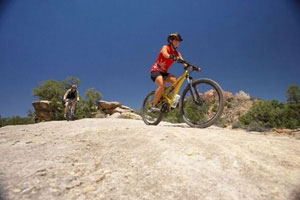
After you have found the perfect bike, do yourself a
favor and get some shoes for it. Bike shoes have a
number of benefits and serious riders don't go without them. So
what's so great about them?
Bike shoes clip directly into the pedal, giving you more power.
They allow you to generate speed with the full range of motion
while pedaling, instead of by simply pushing down on a pedal. They
also protect your feet while pedaling, keeping them dry and
ensuring you are pedaling correctly every revolution. They are
stiffer than a normal pair of shoes, ensuring you are transferring
your energy in the most efficient manner.
Why You Need Bike Shoes
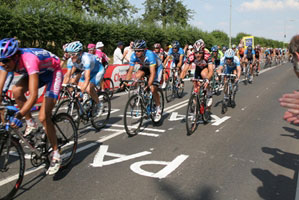
While casual bike shoes are available for
riders who just want to get from A to B, shoes that clip in are
what you want if you are more advanced. But if they are clipped
into the pedal, how do you get out of them?
A major concern for many people transitioning into bike shoes that
clip into the pedal is that they will tip over without being able
to unclip. However, with a simple shake or twist of your foot, the
shoe pops right out of the clip. It might take a little getting
used to at first, but once you have the hang of it, it's easy.
Bike shoes are the ideal solution to getting the most out of your
bike. They provide support and ensure you are not wasting any
energy. And best of all, they will likely last for a long time,
considering their rugged design. If you are looking to take your
cycling to the next level, pick up some bike shoes.
Three Different Types
Bike shoes serve as an essential way to get more out of a ride.
Like every other piece of bicycle gear, there are
a wide variety of choices, so you'll want to be diligent when
shopping for a pair.
Your riding style and what you type of bike you have will have a
significant impact on the type of bike shoes you go with. Here are
the three types of shoes you will have to consider:
- [mageProductLink sku="04883-017-7" title=""]
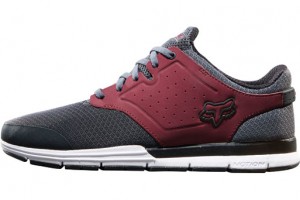 [/mageProductLink]Recreational:
These shoes are for the more casual rider. They don't necessarily
have to clip into the pedal in order to be considered a bike shoe -
they just have to offer a practical solution for getting around
town. These shoes will resemble a hiking shoe, featuring a durable
design that will keep feet safe. If you are using your bike simply
for recreational purposes on the road, these shoes are the right
fit. Often, riders will use pedals with straps for these types of
shoes. Instead of having to clip in every time, you can simply
slide your foot into the straps as you see fit.
[/mageProductLink]Recreational:
These shoes are for the more casual rider. They don't necessarily
have to clip into the pedal in order to be considered a bike shoe -
they just have to offer a practical solution for getting around
town. These shoes will resemble a hiking shoe, featuring a durable
design that will keep feet safe. If you are using your bike simply
for recreational purposes on the road, these shoes are the right
fit. Often, riders will use pedals with straps for these types of
shoes. Instead of having to clip in every time, you can simply
slide your foot into the straps as you see fit.
- [mageProductLink sku="043-13201112390"
title=""]
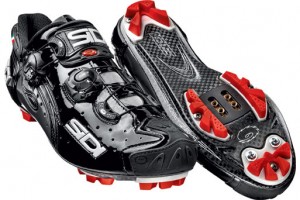 [/mageProductLink]Mountain: Shoes
that are made for mountain biking will feature a more rugged
design, sometimes from a waterproof material, which is perfect for
navigating off-road trails. These shoes will likely be stiffer than
their recreational counterparts, but will still offer a rider some
flexibility for when they have to get off their bike and walk.
Mountain bike shoes can include clipless cleats, in which case they
will be recessed into the sole, while some even offer removable toe
spikes in case a rider needs to hike. The idea behind mountain bike
shoes is to create a fully functional solution for riders heading
off-road. As it can be tough to remain on a bicycle at all times in
the woods, riders will also need a shoe they can hike in.
[/mageProductLink]Mountain: Shoes
that are made for mountain biking will feature a more rugged
design, sometimes from a waterproof material, which is perfect for
navigating off-road trails. These shoes will likely be stiffer than
their recreational counterparts, but will still offer a rider some
flexibility for when they have to get off their bike and walk.
Mountain bike shoes can include clipless cleats, in which case they
will be recessed into the sole, while some even offer removable toe
spikes in case a rider needs to hike. The idea behind mountain bike
shoes is to create a fully functional solution for riders heading
off-road. As it can be tough to remain on a bicycle at all times in
the woods, riders will also need a shoe they can hike in.
- [mageProductLink sku="043-13101122390"
title=""]
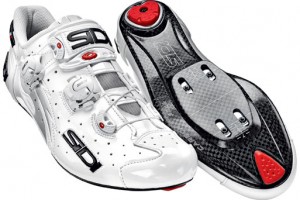 [/mageProductLink]Road: Unlike
mountain bike and recreational shoes, road shoes are not designed
for walking. These shoes feature a clipless cleat that protrudes
from the sole, making walking in them uncomfortable and damaging to
the cleat. The idea is that a rider will be using them solely for
biking on smooth pavement.These shoes clip into the pedals and are
the stiffest of the three designs. They ensure a rider is pedaling
in the most efficient manner possible. Since a foot is clipped into
the pedals, even an upward motion from the leg can push a bike
forward.Road bike shoes are lightweight and usually feature
innovative ventilation to keep a rider cool. Professional racers
will never go without road bike shoes that clip into their pedals,
so serious riders are encouraged to try them out.
[/mageProductLink]Road: Unlike
mountain bike and recreational shoes, road shoes are not designed
for walking. These shoes feature a clipless cleat that protrudes
from the sole, making walking in them uncomfortable and damaging to
the cleat. The idea is that a rider will be using them solely for
biking on smooth pavement.These shoes clip into the pedals and are
the stiffest of the three designs. They ensure a rider is pedaling
in the most efficient manner possible. Since a foot is clipped into
the pedals, even an upward motion from the leg can push a bike
forward.Road bike shoes are lightweight and usually feature
innovative ventilation to keep a rider cool. Professional racers
will never go without road bike shoes that clip into their pedals,
so serious riders are encouraged to try them out.
Comparing The Features
Choosing a bike shoe can be a tough task considering there are so
many different styles, each with their own individual features.
Bike shoes are essential to keeping you comfortable during a ride
and ensuring you are efficient when pedaling. As they are so
important to the success of ride, it's essential you are diligent
when comparing bike shoes. Here are some features you will have to
consider:
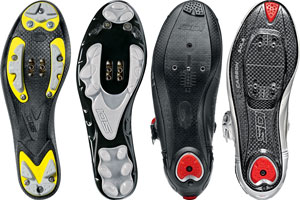 What Type Of Riding You'll Be
Doing
What Type Of Riding You'll Be
Doing
First you'll want to consider the type of riding you plan on doing:
casual, mountain or road. Depending on which of these riding styles
you'll be doing, you will want the right shoes. Casual riding
likely doesn't require a clip-in shoe, while mountain biking might
need a more rugged style in case you have to hike at a certain
point. However, if you are a serious road rider, clip-in shoes are
ideal.
If you decide to go with clipless cleat, you will have to choose
which system you want. The bike shoes will have a specific two-,
three-, or four-hole attachment system built into their sole. These
holes correspond to the bolt pattern used by the clipless system to
attach the cleat to the shoe. Again, this will require that you
consider the type of riding you'll be doing, as well as what pedals
you will be using. A mountain bike system, whether it is a two-hole
or four-hole system, is usually recessed into the sole of shoe,
allowing the wearer to walk in the shoes without worrying about
damaging the cleats. Therefore, it's perfect for mountain biking
and light city riding, as these styles of riding require a rider to
dismount often.
However, if you are a road rider who wants the wheels constantly
turning on the pavement, then a three- or four-hole system is the
right choice for you, giving you stability and comfort. More
mounting points on your cleats spreads the forces applied to the
cleat, giving a more solid, comfortable connection. These cleats
are built to protrude from the shoe, limiting their walking
functionality.
They Fit Tight
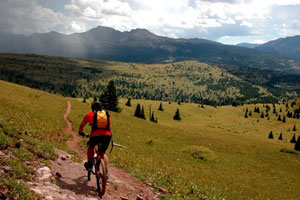
Bike shoes are designed to be stiff and
they aren't made for walking. When you are trying them on, keep
these two things in mind. You could think they are a little too
tight, but they will break in over time. The one thing you'll want
to avoid is having your heel slip out easily. The best bet here
would be to choose a smaller size.
Bike shoes are not like casual shoes that are made for walking
around. Typically, the stiffer they are, the higher-quality the
product. Professionals racers look for a shoe that offers stability
and plenty of support. So how fast you want to unclip or how
serious you are as rider will greatly influence what bike shoe you
choose, as well as its features.
Picking Out Pedals
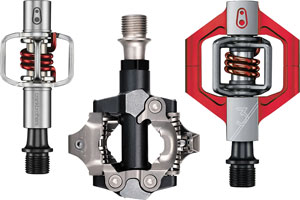
Cycling shoes require compatible
pedals. These shoes
clip into the pedal so a rider's feet are always attached and no
motion is wasted. They are the go-to piece of equipment for
professionals and serious riders.
If you are changing from flat to clip-less pedals, you'll need to
make sure they fit your bike shoes. There are a few options when it
comes to the drill holes in the soles of the shoe: a two-, three-
and four-hole configuration. So what's the difference?
How They Work
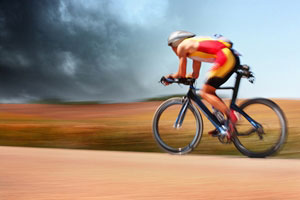 Each clipless pedal has a matching cleat
designed specifically for that brand or style of pedal. Each cleat
system has a specific mounting pattern for the bolts used to attach
the cleat to the bicycle shoes. Therefore, the type of riding you
will be doing will dictate how you'll want to gauge which pedal to
pick up. If you plan on putting clip-less pedals on a mountain
bike, the two-hole option is ideal, while a three- or four-hole
configuration is most likely suitable for the road.
Each clipless pedal has a matching cleat
designed specifically for that brand or style of pedal. Each cleat
system has a specific mounting pattern for the bolts used to attach
the cleat to the bicycle shoes. Therefore, the type of riding you
will be doing will dictate how you'll want to gauge which pedal to
pick up. If you plan on putting clip-less pedals on a mountain
bike, the two-hole option is ideal, while a three- or four-hole
configuration is most likely suitable for the road.
There is somewhat of a learning curve in order to get used to
clip-less pedals. However, once you get the hang of it, you'll
never want to go back. All you have to do is apply some pressure to
a pedal with your foot and it will clip in. This part should be
easy, but stopping is where it might feel awkward at first. In
order to unclip, you'll have to twist your foot and turn your heel
outward. This will release your foot from the pedal. The idea here
is that you only need to disengage your foot once you've come to a
complete stop, otherwise it's attached and pushing you forward on a
ride.
